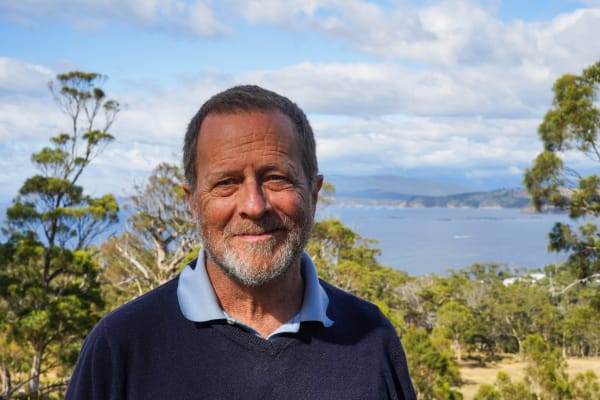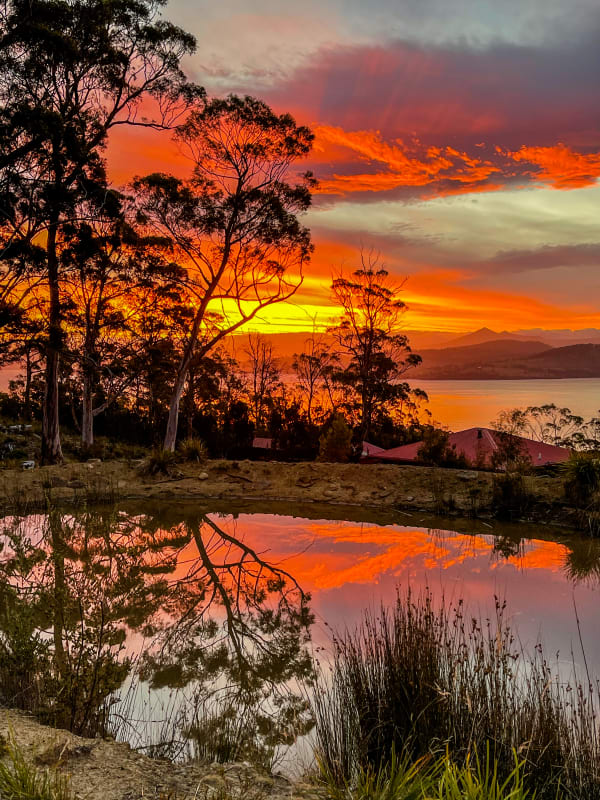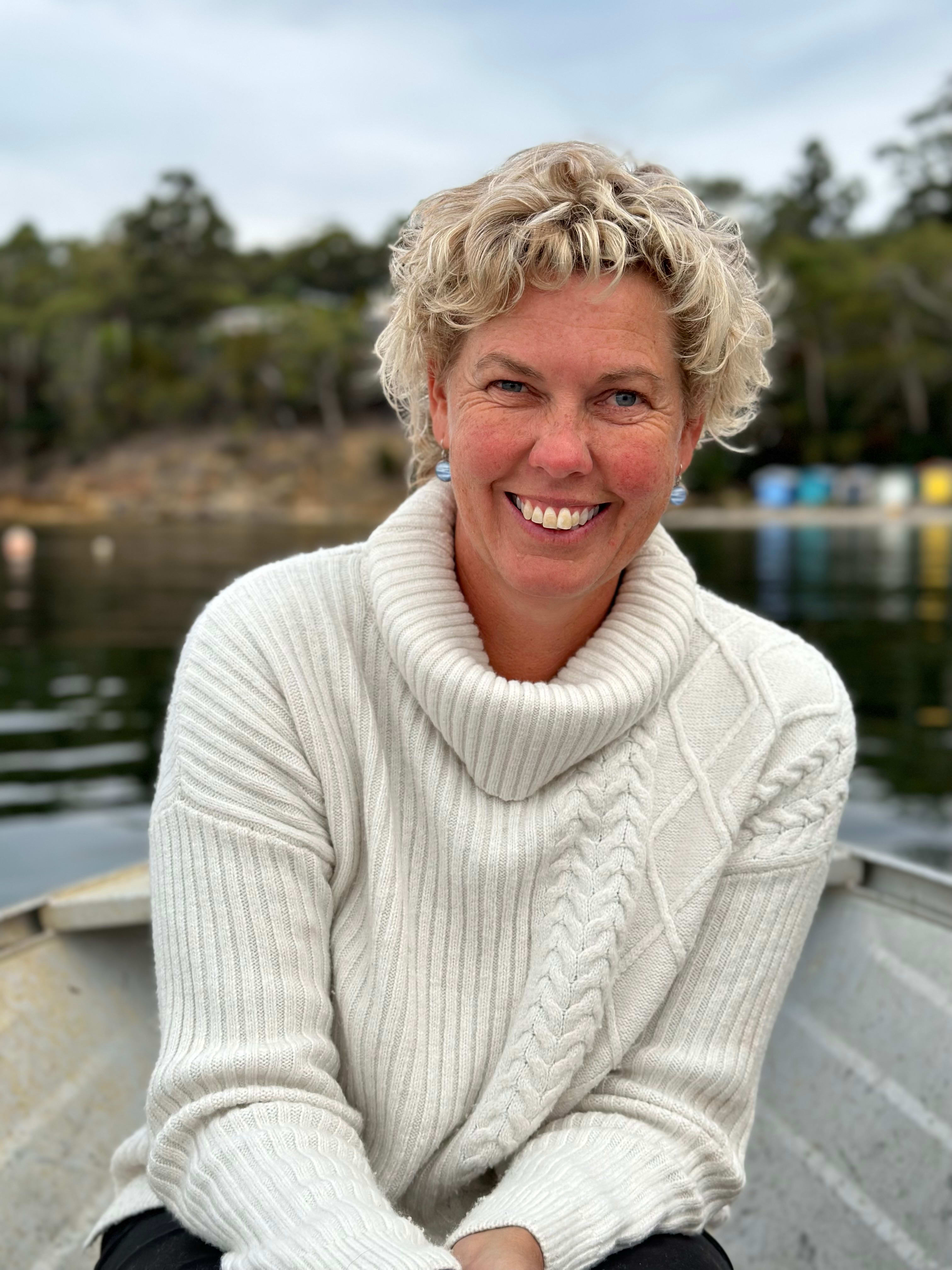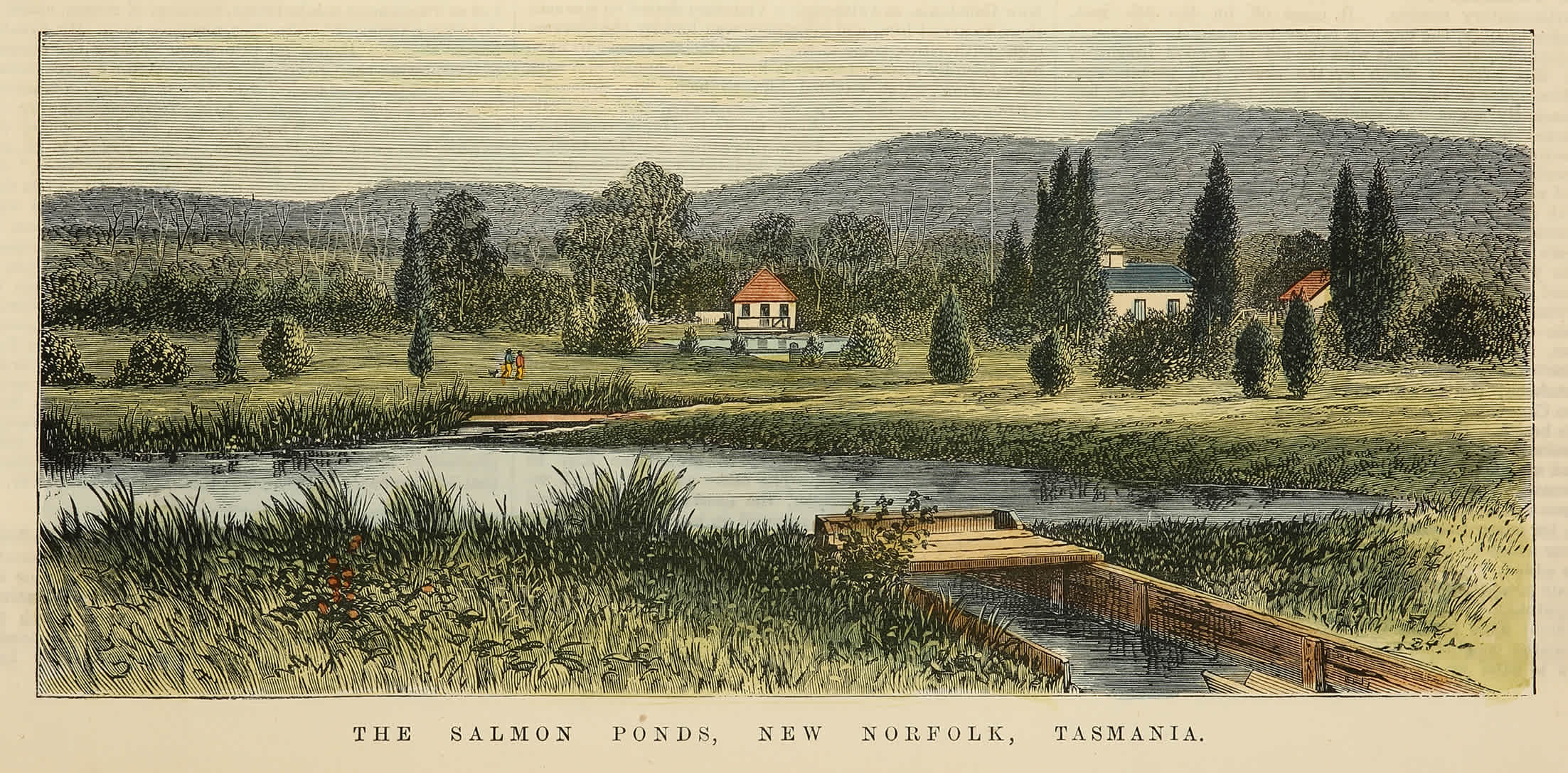A former poet laureate of Colorado, David Mason, now lives with his wife, Christine, an accomplished photographer, an hour south of Hobart on two hectares of land overlooking the Huon River, the D’Entrecasteaux Channel and the Southern Ocean. Dave and Chrissy are my step-father and my mother. So this is something of a family affair: two Australian women who have both spent many years living in the US, examining and portraying, in words and photographs, an American who has chosen to move his life from 40° North to 40° South.
I was asked to write his story, but in the end all I did was ask some questions and let Dave Mason tell his own story, because no-one could do it better.

The meaning of “home” is a recurring theme in your poems, essays and stories. How has living in Tasmania changed the way you think about your home country of America? What is “home” to you now? Is it a place, a language, a natural environment?
This is my home. I grew up in Washington State, 40-odd degrees north, and we had a lovely house on the Oregon coast, almost exactly the same latitude north as our present home is latitude south. In its geography and weather, Tasmania reminds me very much of the San Juan Islands, where I spent much of my childhood. One feels the same need to know the aboriginal culture, the same awareness of colonisation, but without the violence that so deeply mars American life. America is clinging to the last vestiges of civility. It’s an unhappy country – the pandemic and Trumpism have only cast these troubles in sharp relief – and I feel no desire to live there again. Tasmanians should count their blessings, and I think they do.
In what ways has moving to Tasmania affected the way you write, or the images you choose to dwell on (or in)?
There are new place names to learn, new manners, though many of us here are immigrants. In parts of the American west you know you are touching something very old in the land, and you can feel this everywhere in Tasmania. Bushfires are serious events in both countries, and the land has much to teach us about its care and maintenance. Bird and animal life here is omnipresent, so in some ways I feel close to original things, a deep reality and mystery that change the way I dwell. The air is softer than, say, Colorado air, which can be damned near mummifying. Also, this is island life, which feels a bit tippier and less solid than standing on vast continents. One sees the limits of land. I love looking out every day toward the Southern Ocean, orienting myself freshly on this piece of the planet, feeling how far the Roaring Forties wind has travelled, how much of the globe it has crossed, by the time it pounds our house.

I have always written about nature and people who live close to it. I’m also still writing about immigrants, about Greece, where I have lived, the UK, Alaska and the American west. Not being one of those lucky people who have lived their whole lives in one dear, perpetual place, I’m trying to make new and deeper connections, whether in prose or poetry. Having retired from teaching, I don’t have to hurry, squeezing the writing in between other tasks. I still do a lot of reviewing and work for hire, but also feel freer to undertake ambitious projects I have too long been putting off: longer fiction, dramatic work, etc. Knowing there is time, without knowing how much time, changes everything.
In your poem The Voices, you describe walking out into the bush and listening to the voices of immigrants past and present, and feeling “welcome here among the lost”. How has “getting lost” shaped you as a writer? What insights do you think you have gained from being an immigrant?
The Voices [see below] was written after a Dark Mofo art exhibit in which trees in the botanical garden were wired for sound. You walked through them in the dark, hearing these different voices speaking out of flickering lights, and it felt to me like the perfect representation of the intimacy of poetry and the kind of haunted recollection associated with history. This is what I think life is – moving through stories, trying to catch some of their glimmer before they are gone. Eventually everything vanishes, and that’s what gives our impressions their meaning, fleeting as it is. I reside here. Eventually I might be one of those voices flashing out of the dark.

And I feel lucky to have landed here after a lifetime of wandering, lucky to be able to do my work among people and animals I love, learning a new sky and new words for nearly everything. Being “lost” in this way isn’t disorienting at all, but a schooling in enjoyment and wonder.
New Geography
The land’s prow aims for the Southern Ocean
beyond the port at Dover, beyond the tip
of Bruny Island where the lighthouse stands.
And then one thinks beyond. What heaves to mind
is league on league of rolling dreams until
the polar ice.
An island’s like a ship.
At night one fastens on the Pointer Stars
and finds True South, drinking the Milky Way.
Then gouts of rain, a sudden frenzy of air.
The morning is a windbrushed palette of bush
gripping the clay and rock from the last fire
to a dawn like the first dawn ever to be seen.
This little room looks out through gum and she-oak
to the sea. These brief inaugural jottings down
are cast out to the living powers here,
the things I’ve yet to learn of blood and fire
where the sea and river throw their lot together.
A life accumulates like water, dies
like air caught up in all the swirling currents.
Time to discover time as time once was,
seasoned and insatiable as always.
Rhapsody in Blue
To say it began at dawn is not quite true.
It began in the struggle of night escaping dreams
when the bounded world encountered infinite space.
Out of doors the shyest creatures moved
under the high holy vault and Milky Way,
bringing their young to the fresh grass, the spring.
The night was blue and the unblue moon rode high
in a calm sky and the gum trees hardly moved
and the dreamer tossed in his blue doona, turned
in the lathe of his wishes and fears. And when he woke
his own branched hand bent toward him in the sun
streaming through the gums from over the hills.
Blue filled him then, from his eyes to his spine,
an inlet of sea he followed with waking eyes,
an island rising and falling, waking and sleeping
all the way out to the Tasman Sea. Next stop,
forever. Next stop, the albatrossing swell,
the seal rocks and dolphins weaving in the waves.
To rise in the blue world is to fear for its dying
and cling to the one day like a shipwrecked sailor,
remember the distant sneer of politics,
unending sneer and grimace, the demagogue
and the mob, and the burn it all down mentality,
a static in air, a crackle of codes blown clear
where the swallow leads the eye in an upward curve
and the cockatoo scratches the air and the air goes soft
and it scratches and softens above the fairy wrens
feeding in the grass, for there is work to be done,
there are stones to be moved and there is only a day
this day of the endlessness, day of the blue.
The Voices
I came to a wood where dark trees were talking,
their voices sparking in the shadows, near
or distant, singly and in chorus, and I thought:
This is the way of trees, to wait until we least
expect it of them, then to speak from their depths,
the nerves strung out in lines with each new flash.
Black Mary died here, only twenty-one,
of fever.
Wings. A rain-bright bird sank past.
This is the place of all things gathering, known
by no name.
You too are known by no name.
Hear us talking. We are not unlike you.
There a boy died, native of Van Diemen’s Land,
there a soldier, soused, holding a pig’s head.
Women’s voices, voices of men, the solitudes
of trees distinct and intertwined, and all
cast out in the darkness, with a full moon
blurred low on the cloud horizon:
Who are you?
I have come too far to turn away from you.
Migrants, natives and indentured souls
alike were talking in the dark, each flame
an instant dying like a distant star.
And then I knew this forest was my home,
that I was welcome here among the lost.
This was the peace of all untethered lives,
even those who never found the words.
David Mason’s latest books are The Sound: New and Selected Poems and Voices, Places: Essays. Both are available through multiple online outlets, including amazon.com.








